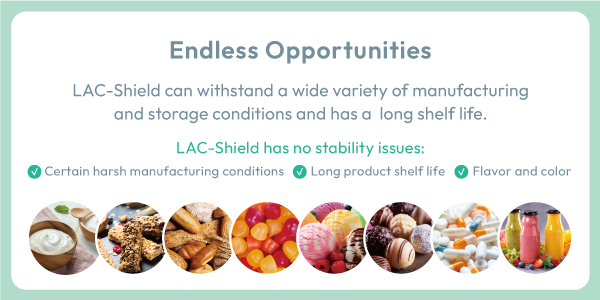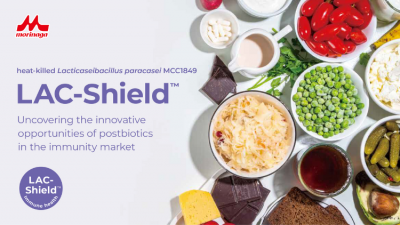Promotional Features
New clinical study of ‘next wave’ biotic shows versatile application potential
Immune health has been a growing focus for consumers for a number of years and especially since the COVID-19 pandemic.
A 2021 study by FMCG Gurus found that 64% of global consumers are now more conscious of immunity since the pandemic.1 The immune system is made up of components such as white blood cells, lymphocytes, and antibodies of those mainly derived from bone marrow, and each one playing a vital part in immune health.
A well-functioning immune system is designed to prevent microbes, such as bacteria and viruses, from entering or harming the body. The gastrointestinal tract (GI) is another important line of defence against microbes, thanks to its mucous lining rich with immune cells, and the acid in the stomach which can eliminate most foreign invaders. Signs of a weak or weakened immune system can include frequent or prolonged episodes of colds, infections with lingering symptoms, and digestive problems.
The body’s immune system can be supported in a number of ways. Lifestyle factors, such as following a healthy diet rich in antioxidants, exercising regularly, minimising stress and getting enough quality sleep, among other healthy habits, can have a positive impact on immune health.
In the same 2021 study, 68% of global consumers said that the COVID-19 pandemic had prompted them to change their diets to address their immune health; a similar proportion expressed an interest in food and beverage products that promote immune health and would buy them even if they do not have a specific health problem.2
This presents opportunities within a growing market for food and nutraceutical manufacturers to formulate functional food and beverage products, and supplements, with ingredients that can support immune health.
Postbiotics and immune health
The effects of commonly used probiotics, such as Lactobacillus and Bifidobacterium, on immune function have been widely studied, with a recent review summarizing their role in suppressing respiratory tract infection (RTI).3
Meanwhile, other studies have indicated the effects of heat-killed Lactobacillus and Bifidobacterium.4 These health-beneficial heat-killed bacteria are called postbiotic, which is defined as intact inanimate microorganisms or cell components with or without their metabolites that have been shown to modulate the immune system and support physical health.
The postbiotic market is expected to reach over $24 million by 2029, at a CAGR of over 10% from 2022-2029.5 This rapid growth is being driven by an increasing consumer awareness of the health benefits provided by postbiotic supplements, as well as the increasing prevalence of various digestive diseases.
Among these, heat-killed Lacticaseibacillus paracasei MCC1849 (LAC-Shield™, strain name ‘MCC1849’) has been shown to modulate the immune system.6 In a clinical trial, MCC1849 intake was found to enhance the responsiveness of acquired immunity to influenza vaccination in people aged 85 years or older, indicating the potential to improve immunity and maintain health in aging populations.7
In another study in healthy young women who were susceptible to cold, the onset of cold-like symptoms was suppressed by the ingestion of MCC1849.8
Because age and sex appear to affect the responsiveness to vaccines, and therefore potentially the immune system, a new randomized, double-blind, placebo-controlled study looked at the effects of MCC1849 on subjective symptoms of the physical condition of a wider population of 200 healthy male and female adults from age 18 to over 70.9 After the 24-week period, the number of days of stuffy nose and cold-like symptoms was significantly reduced in the MCC1849 group compared with the placebo group without any observed side-effects, indicating that oral intake of MCC1849 is consistent in efficacy and may help to maintain physical condition across a wide range of the population.
LAC-Shield™ for immune health
Heat-killed L. paracasei MCC1849 was selected from Morinaga Milk's extensive stock of lactic acid bacteria (LAB) strains and it was named as LAC-Shield™. Acting as a protective ‘shield’ for the human body against external threats, LAC-Shield™ is a convenient and accessible way for formulators to incorporate biotic ingredients into food, beverage and supplement products that appeal to today’s consumers.
As a scientifically validated postbiotic strain with immune-enhancing properties, LAC-Shield™ exhibits the capacity to stimulate the production of interleukin-12 (IL-12), a critical cytokine that plays a pivotal role in regulating the immune system by bridging innate and adaptive immunity.
While postbiotics are less susceptible to environmental conditions than probiotics, different strains confer different effects, for example in terms of their stability and versatility. However, the heat-killed bacteria in LAC-Shield™ are heat tolerant and highly stable to pH, while maintaining their beneficial properties, making them a convenient ingredient across a range of applications.
LAC-Shield™ has been commercially available in Japan since 2014. It is widely used to promote health and wellness in over 1,000 dietary supplements and functional food products by over 500 companies in Japan and expanding to the rest of the world, particularly in products that require high heat, such as baked goods and snacks, as well as ready-to-drink beverages, gummies and seasonings, without impacting color, texture, and flavor.
As consumers continue to proactively manage their health, the study of postbiotics and their potential for application in industry is ripe for development and opportunity. However, the current level of consumer understanding on the term ‘postbiotics’ is still a challenge for manufacturers.
To help address this, Morinaga has created new branding and logo for LAC-Shield™ to improve consumer awareness and recognition, and better communicate a more solid understanding of the benefits of postbiotics. The product’s new branding has been designed to reflect the ingredient’s versatility to be always adapting to support the wellbeing and resilience of adult and senior populations across a wide range of environments and lifestyles.
As immune health continues to be a growing interest for consumers, LAC-Shield™ can help manufacturers differentiate their formulations across a range of dietary supplements and functional food and drink applications, tapping new markets and unlocking opportunities to support consumer needs, now and in the future.
References
1. FMCG Gurus. What’s Next for Immune Health in 2021? February 2021.
2. FMCG Gurus: How COVID-19 Changed Consumer Behaviour, 2021. March 2021.
3. Lehtoranta, L.; Latvala, S.; Lehtinen, M.J. Role of probiotics in stimulating the immune system in viral respiratory tract infections: A narrative review. Nutrients 2020, 12, 3163. PubMed. (Cited in new study)
4. Scott, E.; De Paepe, K.; Van De Wiele, T. 2022. Postbiotics and their health modulatory biomolecules. Biomolecules 2022, 12, 1640. (Cited in new study).
5. Meticulous Research® Postbiotics Market to Reach $24 Million by 2029. GlobelNewswire.
6. Maehata, H.; Arai, S.; Iwabuchi, N.; Abe, F. Immuno-modulation by heat-killed Lacticaseibacillus paracasei MCC1849 and its application to food products. Int. J. Immunopathol. Pharmacol. 2021, 35, 20587384211008291. PubMed.
7. Maruyama, M.; Abe, R.; Shimono, T.; Iwabuchi, N.; Abe, F.; Xiao, J.Z. The effects of non-viable Lactobacillus on immune function in the elderly: A randomised, double-blind, placebo-controlled study. Int. J. Food Sci. Nutr. 2016, 67, 67–73.
8. Murata, M.; Kondo, J.; Iwabuchi, N.; Takahashi, S.; Yamauchi, K.; Abe, F.; Miura, K. Effects of paraprobiotic Lactobacillus paracasei MCC1849 supplementation on symptoms of the common cold and mood states in healthy adults. Benef. Microbes 2018, 9, 855–864.
9. Sato, S.; Arai, S.; Iwabuchi, N.; et al. Effects of Heat-Killed Lacticaseibacillus paracasei MCC1849 on the Maintenance of Physical Condition in Healthy Adults: A Randomized, Double-Blind, Placebo-Controlled, Parallel-Group Study. Nutrients. 2023; 15(15):3450.









